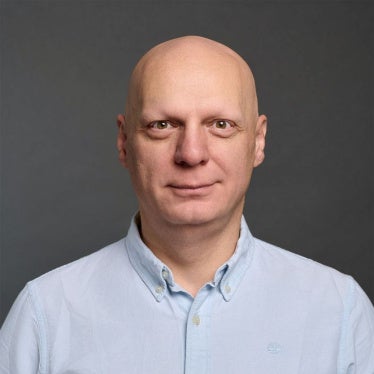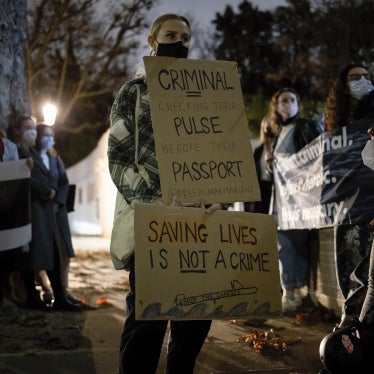Just three years ago, Anar Mammadli, a prominent Azerbaijani human rights defender, and I were here in Strasbourg together. It was the 10-year anniversary of Azerbaijan’s Council of Europe membership. Along with a small group of activists, we were urging parliamentarians and staff members not to shower the Azerbaijani government with the prestige it was seeking on the anniversary but to call on it to turn around the country’s deteriorating human rights situation.
Anar was a passionate and articulate advocate for his colleagues who were languishing in Azerbaijani prisons on politically motivated charges. He never tired, in meeting after meeting, of explaining to the European politicians how Azerbaijan was not meeting its accession commitments over a decade after joining this body and what the Europeans should do to change the situation.
Little did I know then that a time would come when I would be doing many of the same meetings without him -- but here I am this time around asking the parliamentarians to press the Azerbaijani leadership to secure Anar’s release from prison. Today Azerbaijan’s president, Ilham Aliyev, will address the Council of Europe’s Parliamentary Assembly, and there is no better time for the Council of Europe to speak with one voice about the need to free Anar and the many others like him who are behind bars on politically motivated charges.
Just last month, Anar was convicted of alleged interference in the election results, as well as tax evasion and illegal entrepreneurship, and sentenced to five-and-a-half years in prison.
Anar is the chairman of the Election Monitoring and Democracy Studies Center (EMDS), an independent election watchdog group. Since 2001, Anar has exposed election fraud and politically motivated arrests and prosecutions in Azerbaijan. He carried out this work in advance of the October 2013 presidential vote, in which President Ilham Aliyev was re-elected for a third term.
It is clear that Anar and his colleagues were targeted for their critical reporting. The prosecutor general’s office opened the investigation against EMDS a week after the group published a preliminary post-election report that concluded that the election failed to meet international standards. The findings were echoed in the conclusions of the Organization for Security and Co-operation in Europe.
A particularly cynical charge against Anar was “abuse of office,” allegedly for intending to influence the election results. Other charges, like tax evasion and illegal entrepreneurship, stem from the fact that the government has denied Anar’s group official registration, despite the group’s numerous attempts to register. The EMDS has been using a registered organization to receive grant money, a common practice in Azerbaijan as human rights groups routinely face difficulties when they try to register.
In his last word before the verdict, Anar reminded the court that freedom of association is a fundamental right of every citizen of Azerbaijan and that it is the government’s duty to recognize this right without political discrimination. It did not save him from a harsh sentence.
Amnesty International has declared Anar a prisoner of conscience. Two UN monitors have also urged Azerbaijan to drop charges against him, and the Council of Europe rapporteur on human rights defenders also expressed profound concern about Anar’s conviction and the closing space for independent groups to work in Azerbaijan.
Anar’s prosecution is indicative of how willing Azerbaijani authorities are to blatantly silence a messenger and to abuse the criminal justice system to punish and deter their critics. Sadly, his case isn’t unusual. In the past year, Azerbaijani authorities have arrested dozens of political activists, journalists, bloggers, and the like on bogus charges.
Anar’s abusive prosecution also suggests that Baku believes it can simply let criticism by international human rights bodies roll off its back. The Council of Europe’s leadership should not let this happen. Aliyev is in Strasbourg today because Azerbaijan holds the rotating chairmanship of the body’s Committee of Ministers. The leadership in Strasbourg should remind President Aliyev that the chairmanship comes with the responsibility to respect the fundamental freedoms this organization is built on.








